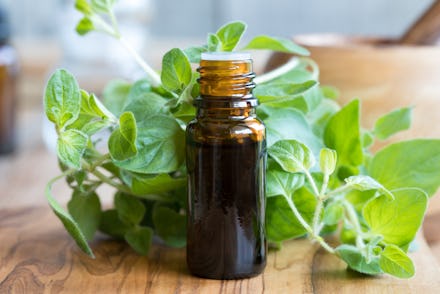Oregano oil is not your coronavirus savior

Oregano, as an herb, is a delicious staple in many kitchens and herb gardens, but oregano oil is slightly less ubiquitous. A lot of naturopaths (and wellness influencers) tout its supposedly curative antimicrobial, antifungal, and antiviral properties. Some “alternative medicine experts” have claimed that not only can it boost your immunity, but that oregano oil can “cure COVID-19.” While I respect the food-as-medicine tribe, claiming anything to be a coronavirus cure right now can be not just disappointing, but dangerous. I talked to both holistic and medical experts to find out what oregano oil can actually do for your health.
Snake oil salesmen aside, most naturopaths believe that oregano does have benefits for treating intestinal parasites, colds, and allergies. The ones I spoke with seemed (justifiably) suspicious about the claim that oregano can cure or even treat coronavirus. “We should keep in mind that most of the studies on oregano have been conducted in-vitro, which means that it was in a test tube and only against particular viruses,” Kasey Nichols, a naturopathic physician in Arizona tells me, and explains that the active ingredient in oregano is a chemical called carvacrol.
Oregano may help kill some viruses on surfaces if you clean with it, but that doesn’t mean that it can kill viruses inside the human body.
“Carvacrol is able to penetrate the capsid, or protein covering, of a virus and interfere with the virus's DNA or RNA,” Nichols says, but adds that experiments conducted in test tubes in labs do not necessarily translate into humans and that even though carvacrol can kill some viruses, it may not kill all viruses. And since the novel coronavirus is, well, novel to us — we can’t, on any level, assume oregano oil could combat this beast.
“We have no data that oregano oil specifically kills the coronavirus,” agrees Lindsey Elmore, a New York City-based pharmacist and author of Essentials: 75 Answers to Common Questions about Essential Oils and Supplements. Elmore explains that carvacrol has been effective in reducing surface transmission of some viruses that affect humans, like herpes and the flu. Elmore adds that “neither oregano nor carvacrol have been shown to be effective against SARS-CoV, the pathogen that caused the 2002-2003 coronavirus epidemic.” What that means, Elmore explains, is that oregano may help kill some viruses on surfaces if you clean with it, but that doesn’t mean that it can kill viruses inside the human body.
The medical doctors I spoke with agree that oregano can beneficial, but not for combatting coronavirus. “Preparations of oregano have been used across many cultures for over 2000 years to treat common colds and digestive problems,” Farshad Fani Marvasti, a family medicine physician in Phoenix, tells me.
“The best way to prevent yourself from getting sick from COVID-19 is to stay home and keep your physical distance from others,” Marvasti says.
Oregano oil can be considered part of a broader approach to staying healthy, Marvasti says, but ingesting it at certain dosages can be toxic. He recommends taking no more than 4-5 drops, diluted in a glass of water over no more than 4-5 days without consulting a doctor. “The best way to prevent yourself from getting sick from COVID-19 is to stay home and keep your physical distance from others,” Marvasti says, in agreement with the other experts.
So, besides cleaning and for potential preventative measures, what exactly is oregano oil proven to be beneficial for? Treating high cholesterol, for one thing. “Studies have found that taking oregano at each meal for three months can reduce bad cholesterol and increase good cholesterol,” Carrie Lam, a family physician and naturopath in Pasadena tells me. This might be because carvacrol and the other active chemical in oregano, thymol, are both polyphenols, or micronutrients, that have been found to regulate cholesterol.
Lam also says that oregano oil can be used to treat intestinal parasites, which are more common than we think and are a major issue in developing countries. Intestinal parasites are worm-like creatures that make it into your intestines, eat your food, and prevent you from absorbing nutrients (rude). But again, if you suspect you have intestinal parasites and you want to treat them with oregano oil, you need to be under a doctor’s care, because Lam suggests that this treatment is most effective when patients take the oil in small doses — about 200 mg — for six weeks, which is longer than oregano oil should be ingested unsupervised.
So oregano oil can’t kill COVID-19, but it can help eliminate some other pretty nasty things and it can help your body regulate cholesterol. Just be careful with it. And if you’re nervous about taking the oil, which, in my opinion, is barely drinkable no matter how diluted, you can still grow some in your window box and cook with it. It won’t be as concentrated as the oil, but it also won’t be dangerous, and you can throw that oregano oil in your diffuser and enjoy a gentle, wafting pizza parlor aroma if it’ll keep you on the couch.